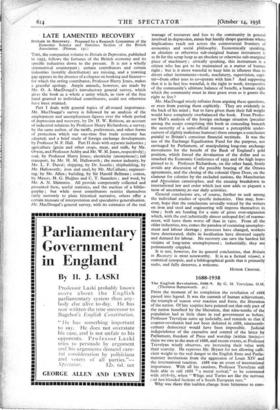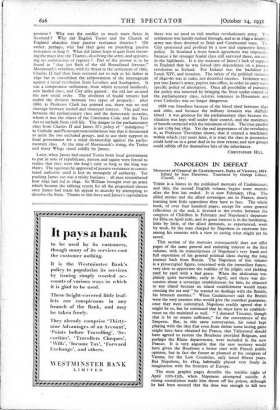1688-1938
The English Revolution, 1688-9. By G. M. Trevelyan, O.M. (Thornton Butterworth. 5s.)
FRoM the moment of its completion the revolution of 1688 poised into legend. It was the summit of human achievement, the triumph of reason over reaction and force, the liberation of the nation. Of late sceptics have pointed out that only part of the nation benefited by the liberation, that nine-tenths of thq population had as little share in real government as before. Professor Trevelyan sums up judicially, and reminds us that if counter-revolution had not been defeated in 1688, nineteenth-. century democracy would have been impossible. Judicial independence of the executive and control of the latter by Parliament, freedom of Press and worship (within limits)-7 these we owe to the men of 1688, and recent events, as Professor Trevelyan wisely observes, are increasing their value with their scarcity. He reproves Mr. Bryant for not allowing suffi- cient weight to the real danger to the English State and Parlia; mentary institutions from the aggression of Louis XIV and the international reaction. 1688 was an event of international importance. With all his cautions, Professor Trevelyan still feels able to call 1688 " a moral revival," to be contrasted with 1678-85, when " Whigs and Tories act like the nervous cnd hot-blooded factions of a South European race."
Why was -there -ibis -1sudden.change from 'bitterness to com-
promise ? Why was the conflict so much more fierce in Scotland ? Why did English Tories and the Church of England abandon their passive - resistance theories ? (Or rather, perhaps, why had theY gone on preaching passive resistance so long ?) What did James hope to gain from throw- ing the mace into the Thames, dissolving the army, and appoint- ing no commission of regency ? Part of the answer is to be found in " that last flash of the old Roundhead fervour," Monmouth's rebellion, with its threat to the settlement of 166o. Charles H had then been restored not to rule as his father in 164o but to consolidate the achievements of the interregnum against a social revolution from Levelers and Anabaptists. It was a compromise settlement, from which restored landlords, new landed class, and City alike gained : the old law secured the new social order. The abolition of feudal tenures had ended the division between two types of property : after 1660, as Professor Clark has pointed out, there was no real cleavage between landed and moneyed interest. The gulf was between the parliamentary class and the democratic sectaries, whom it was the object of the Clarendon Code and the Test Act to exclude from civil life. The danger to the parliamentary class from Charles II and James II's policy of " indulgence " to Catholic and Protestant nonconformists was that it threatened to unite the two excluded groups, and to use their support in local government for a royal dictatorship against the parlia- mentary class. At the time of Monmouth's rising, the Tories and many Whigs stood solidly. by James.
Later, when James had ousted Tories from local government to put in sons of republicans, parson and squire were forced to realise that they were the king's only so long as the king was theirs. The squirearchy approved of passive resistance to consti- tuted authority until it lost its monopoly of authority. Yet pushing James out was a tricky business : all men remembered how 1642 had led to 1649. So William brought over an army which became the rallying centre for all the propertied classes once James had made his appeal to anarchy by attempting to dissolve the State. Thanks to this force and James's capitulation there was no need to risk another revolutionary army. Ti settlement was hastily rushed through, and as in 1649 a doubtful army was then diverted to Irish and Continental wars.
City sponsored and profited by a new and expansive foreign policy. In Scotland a front bench agreement was impossibl because a far stronger-feudal clasS still survived there, not only in the highlands. It is the measure of James's lack of support in England that he was forced into dependence on a peasant revolution in Ireland: For Ireland was the backdoor for Louis XIV, and invasion. The safety of the political victories of 1640-60 was at stake, not doctrinal niceties. Irishmen were put into James's army, papists into office, in order to carry out a specific policy of absolutism. Once all possibility of pursuing the policy was removed by bringing the State under control of the parliamentary class, relative tolerance to Dissenters and even Catholics was no longer dangerous.
1688 was bloodless because of the blood shed between 1640 and x66o, and because the military invasion was skilfully timed : it was glorious for the parliamentary class because the situation was kept well under their control, and the maximum of benefit extracted with the minimum of risk. The true parallel is not 1789 but 183o. Yet the real importance of the revolution is, as Professor Trevelyan shows, that it created a machinery within which (15o years later, it is true) the class in possession could hold on to a great deal in its slow retreat, and new groups could nibble off for themselves bits of the inheritance.
CHRISTOPHER HILL.



















































 Previous page
Previous page